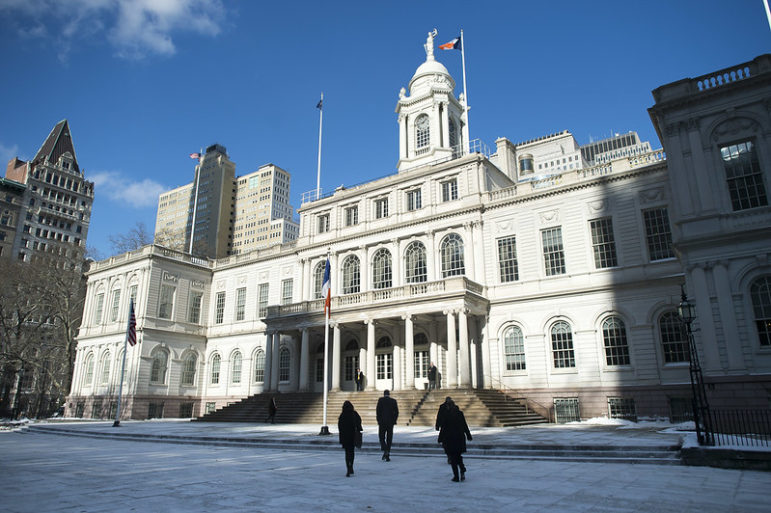The event, hosted by NBC New York, Telemundo and Politico, featured slightly different questions than many of those asked in previous debates. Of course, ardent debate watchers will note that many of the candidates’ answers were not exactly new, but the format did elicit some interesting moments.

Rob Bennett/Mayor’s Office
The next mayor faces both challenges and opportunities.
Decidedly fewer attacks characterized the fourth and final debate between the top eight Democratic candidates for New York City mayor on Wednesday, in which the hopefuls pitched their proposals for the city’s biggest problems.
The event, hosted by NBC New York, Telemundo and Politico, featured slightly different questions than many of those asked in previous debates — candidates were asked to make elevator pitches to woo hesitant CEOs hoping to do business in the city, to struggling landlords and tenants worried about housing costs, and to reluctant police recruits.
Of course, ardent debate watchers will note that many of the candidates’ answers were not exactly new, but the format did elicit some interesting moments.
Here are City Limits’ main takeaways from the more than two-hour event:
- While he has frequently been both the subject (and the source) of attacks in previous debates, nothing said Wednesday appeared to threaten frontrunner Eric Adams’ position in the lead.
A former police captain and current Brooklyn borough president, Adams seems most comfortable talking about his strategies to combat crime, which include a plainclothes unit dedicated to guns and the redeployment of stop-and-frisk.
Wednesday’s debate, which, like the others before it, focused a lot on public safety, offered Adams a chance to massage some of the concerns about these proposals, giving him time to (quite wisely) explain that both “intervention and prevention” were part of his plan.
“We can’t wait until we have 3-year-olds shot in Times Square,” Adams said. “If we don’t get gun violence under control, it’s going to stop our economic recovery. And I believe we can do so by preventing the flow of guns in our city.”
Yang, asked next to assure New Yorkers how they would be safer with him leading the city, took a dig at Adams by touting his recent endorsement from the police captains’ union. “Eric’s former colleagues in the police captains’ union — people who worked with him for years, people who know him best — they just endorsed me,” he said.
It was both a strong and a weak moment for Yang, who has slid from his position near the head of the pack, according to a recent Marist poll. In dedicating his time to attacking Adams, who coolly claimed he didn’t seek the union’s endorsement, he failed to answer the question.

- The mayoral candidates differed significantly on their plans for addressing homelessness and mental health.
Housing and homelessness were equally contentious subjects on the debate stage Wednesday, a subject that is more urgent in a city on the verge of an eviction crisis.
While some talked up building new housing and helping the mentally ill with city-funded services and programs, Yang, who has adopted more conservative positions on policing than some of his rivals, was quite critical of the street homeless and those with mental illness, who he said are driving families out of the city.
“I’m frustrated by the political nature of these responses,” Yang said. “We’re not talking about housing affordability, we are talking about the hundreds of mentally ill people we all see around us everyday, on the streets and the subways. We need to get them off of our streets and our subways,” Yang said, adding that the city needs to increase the number of psych beds.
It underscores a point that Yang has made in the past, though it awkwardly sidestepped some of the more serious points and proposals raised by other candidates about mental health programs and supportive and permanent housing.
“That is the greatest non-answer I’ve ever heard in all of our debates,” Stringer said in response, a standout moment of the night.
“Not one specific idea, not one specific plan,” he added, later asking Yang, “How much is this going to cost, do you have any idea?”
Yang did not answer the question, though he expressed surprise at the attack, later doubling down.
“Mentally ill people have rights, but you know who else has rights? We do — the people and families of the city,” he said. “We have the right to walk the street and not fear for our safety because a mentally ill person is going to lash out at us.”
Morales offered another sharp critique of Yang’s plan. “Andrew is talking about the people who are afraid and that are leaving, but the people that are actually suffering deserve the kind of care and attention just as much as anyone else.”
- No one is getting enough sleep!
We got a moment of levity in the second portion of the debate, when candidates were asked how much sleep they get each night. Here, we learned that all eight candidates are pretty sleep-deprived, with none saying they got more than six hours of shut eye.
With the primary election less than a week away for races across the city, and the COVID-19 pandemic ongoing, it is certainly an overwhelming time for both candidates and voters.
For more information, check out City Limits’ Council Countdown series, produced in partnership with City and State, Gotham Gazette, and the Queens Daily Eagle, offering insight into all of the upcoming Council races. We’ve also done extensive coverage of the mayoral and comptroller’s races.
Have a question about the primary election, or a tip to share with us? Contact ese@citylimits.org.








